|
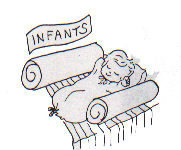
Babies can move by kicking their feet and pushing their
bodies, so they may fall off a flat surface. When babies are
laid on a bed, barriers should be placed around them to
prevent them from falling, and their position should be
checked often.
|
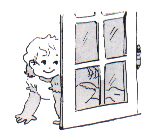
Babies discover open doors and will travel where there
are might be danger. They also like to close doors and may
close them on their fingers. All doors should be closed or
doorways blocked with secure barriers.
|
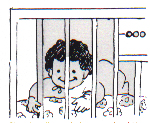
Slats in cribs and playpens should be no
more than 2 3/8 inches (6 cm) apart so a baby's head cannot
be caught between the slats. If there is more than a
two-finger space between the mattress and the side of the
crib, the mattress is too small. An infant could suffocate
by wedging his or her head in this gap.
|
|
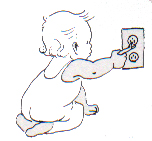
Babies like to poke things into electrical
sockets and pull cords. To prevent these dangers, cover
should be placed over unused sockets. Lamps and appliances
that are not used should be put away. The cords of lamps and
appliances that are used need to be made inaccessible to a
babies reach.
|
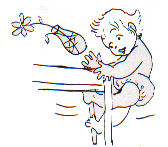
Babies like to pull themselves up on any available
furniture. Tables and chairs that are not stable should be
removed while babies are in this stage.
|
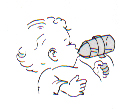
Bottles, propped in bottle holders, should
not be offered to small babies. Milk may flow too fast and
cause choking or digestive problems. Instead, small babies
should be held so the milk flow can be
controlled.
|